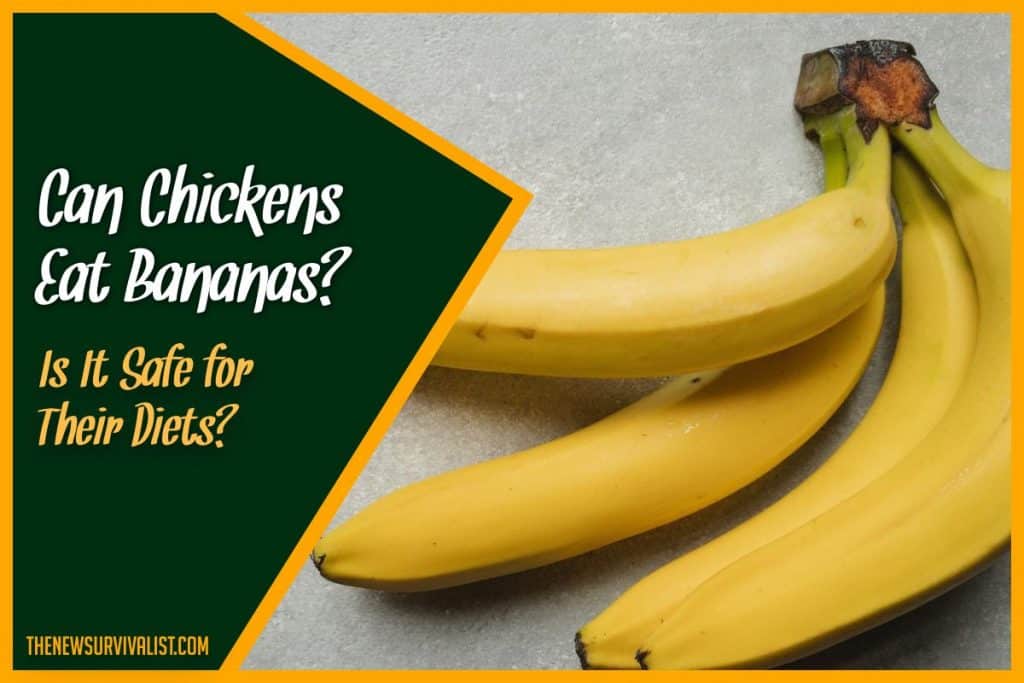Bananas are amazing fruits and can be turned into afternoon snacks, smoothies, and even ice cream when treated right. They’re a yummy food that’s pretty popular in nature as well, extending to a whole host of wandering animals. Does that extend to chickens though? Can chickens eat bananas?
Yes, and mostly yes. Chickens love bananas, and make for an awesome supplement to their diet – rich in Vitamin B6, C, Magnesium, and Potassium. Bananas are very nutritious fruits, and even their peels can be served to chickens as treats. Just make sure that you’ve properly prepared the peel, as they might be enriched with undesirable pesticides.
Bananas are just plain good food and help hens lay better quality eggs. However, due to its high sugar content, you should only feed bananas to your chickens sparingly.
Can Chickens Eat Bananas?
Nutritional Information of Bananas
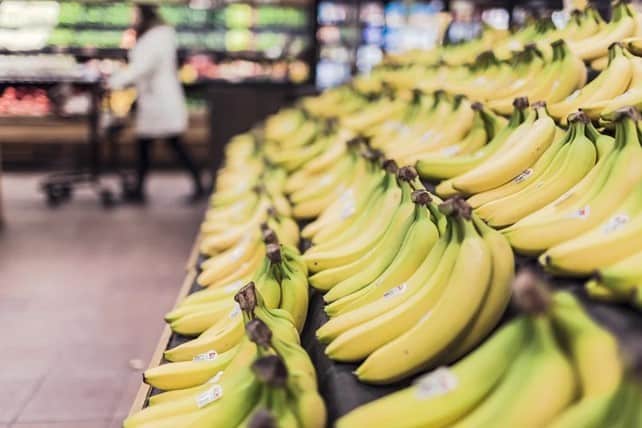
Like most fruits, bananas are completely free of both fats and cholesterol, which helps keep their eggs and meat more manageable for consumers. They make for an amazing treat for your chickens, offering all of the following primary benefits.
Vitamin B6
Bananas provide a great source of vitamin B6. A small serving of banana can readily meet a chicken’s daily need of the vitamin. Vitamin B6 helps the body metabolize carbohydrates and vital amino acids, helping them transition reserves into productive energy.
It also makes for a critical component in a healthy, responsive nervous system. B6 does so by encouraging and optimizing the production of neurotransmitters in the body, being consumed to produce serotonin, GABA, and norepinephrine.
Vitamin C
Bananas also provide a surprising supplement to a chicken’s Vitamin C needs. Vitamin C helps the body handle disease by bolstering the immune system. It also mitigates tissue damage to a certain extent, on top of improving iron absorption in their bodies. Vitamin C also heavily contributes to the production of serotonin, which helps keep your chickens sedate and content.
Vitamin C helps your body produce collagen, which is vital for chickens. Most chickens reared are far larger than their counterparts decades ago. This comes at the cost of greater strain on their legs to support their weight. Collagen allows their bodies to firm up and manage themselves better.
Potassium
Bananas are best known for their potassium content and provide benefits to metabolism, muscle strength, muscle contractions, fluid balance, and nerve functionality. Potassium also helps with collagen development and improves blood flow for your chickens.
A diet rich in potassium also helps offset the worst effects of feeds rich in sodium chloride – better known as salt. Too much salt in their diets could easily lead to defects in their eggshells, and it would be very difficult to pinpoint this concern amidst a whole other range of possibilities.
Magnesium
Magnesium has pretty normal benefits other vitamins already covered above, like regulating nerve and muscle functionality. It’s also a vital component to building back bone, DNA, and protein in the body. What makes them stand out is here is its effect on one’s restfulness.
Magnesium helps relieve tension in animals, giving them sounder sleep cycles and noticeably lowering the emergence of common symptoms of anxiety, depression, and other forms of emotional duress.
Do Chickens Enjoy Eating Bananas?
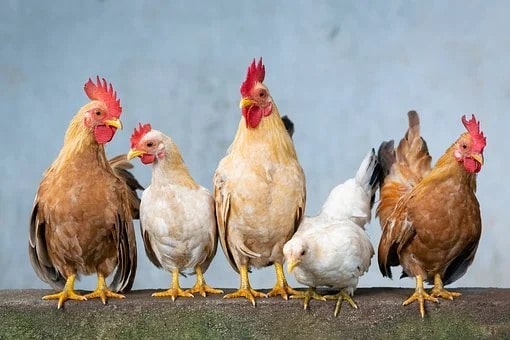
Chickens aren’t very picky eaters, but they usually go crazy over bananas! Preferences will vary among your flock – some might enjoy them, and others could ignore it, or prefer other types of treats like blueberries, blackberries, or even tomatoes.
While most other common treats need to be served in separate bowls to avoid conflict, bananas can get by with a bit more leeway. The main drawback of blackberries, blueberries, and tomatoes is their relative tenderness. This trait makes them not only very easy to smear but difficult to serve communally.
Bananas are much firmer than those three and can be hung in common areas with little fuss. This has the added benefit of keeping the pest-attracting treat off the floor. This perk degrades a bit over time with ripeness, as the banana will turn mushier and possibly slough off the suspension.
Can They Eat the Peels?
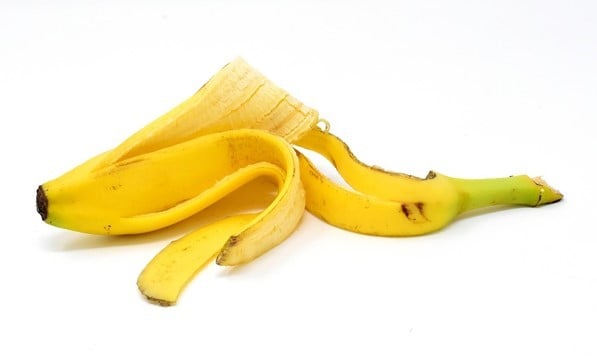
Banana peels are, technically speaking, perfectly edible not only for chickens but humans as well. They’re often eaten outside of the USA and can be prepared very easily for consumption.
The reason that’s a technical thing rather than practical advice is the potential of pesticide contamination. The vast majority of fruit products grown commercially are heavily treated with pesticides, and this “runoff” usually concentrates on parts of the fruit not expected to be eaten. Banana peels are to bananas as calyxes – the green top of the fruit – are to berries.
Banana peels are also very tough, to the extent even strong beaked fowl will have some difficulty eating it. Chickens may ignore banana peels if they aren’t sliced into a more compact form.
Banana peels do possess a great amount of fiber, cellulose, and even antioxidants. All of these combined really help your chicken’s digestion and make for wonderful additions for something that would have just gone to waste in your trash bin.
How Often Should You Give Them Bananas? Just How Much?
![]()
Bananas follow the usual chicken treat rules: namely, to keep their serving to always be under 10% of their diets. This is shared with other treats, so be mindful of the cumulative quantity rather than tracking their fruit range individually.
For most chickens, this amounts to about a fifth of the banana at best. Make sure to include the peel for this, as banana peels count as a treat if we’re going purely off a nutritional basis.
When giving your chickens bananas, try to serve them these early in the morning. Chickens have better digestion at this point of the day. Be mindful in remembering that these are treats – just because bananas are very nutritious doesn’t make them healthy in the long run for larger quantities.
Another common point between all the treats mentioned is their very high sugar content, which chicken digestive systems cannot process as efficiently as humans do. Too much sugar could lead to a condition called sour crop, which disrupts normal bacteria cultures in their crop and can easily turn fatal if untreated.
If you’re serving them overripe bananas, make sure to drop portions accordingly to offset the extra ripeness. Overripe bananas aren’t all bad though – they’re even richer in antioxidants than their normal versions. It simply becomes a choice between preference and convenience at this point.
Storing And Preparing Bananas and Banana Peels
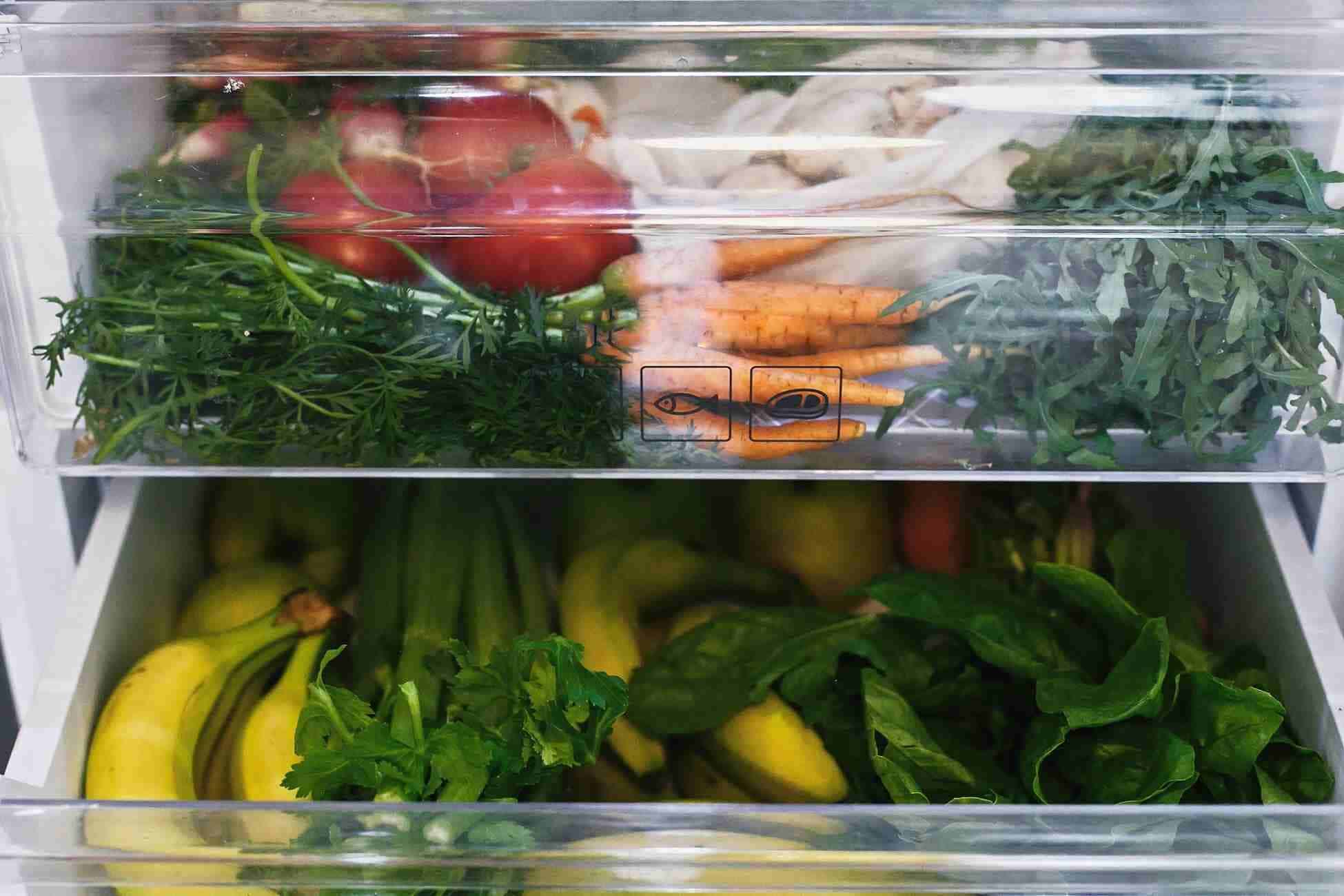
Ideally, bananas are best served less ripe. Ripeness brings out more sugar, which in those quantities chickens can’t process properly. You have to adjust the amount if your bananas have aged a bit.
Storage
Bananas can be stored safely outside of the fridge, and can usually manage at least for two days for no real risk. They can last even longer when stored in cool, dry areas, though it’s important to track just how much they’ll ripen over time.
A hand of bananas lasts much longer attached to the crown of the bunch, which is the top part of the set. This longevity can be further extended by wrapping it with cling wrap, up to potentially a week in ideal conditions.
You can also refrigerate bananas, but only if they’re a bit ripe. Storing them while they’re green keeps them from ripening altogether, which makes them less desirable for everyone. Bananas also lose nutritional value in cold storage, as most tropical fruits do.
Preparation
When you’re feeding baby chicks, it would be best to mash the bananas. Their beaks aren’t quite firm enough yet, and they’ll struggle to eat it if served in any other way. Baby chicks benefit a lot from bananas, so it’s best to have them eat their portioned fill and have them develop properly.
Bananas are thankfully a lot hardier than other common treats and can be served with very little fanfare in most cases. Just make sure to keep bananas separate from their main feed, and limit the quantity you set aside for them.
The peels on the other hand require more than a little prep work. The initial barrier for their use is the presence of pesticides, as most will suffuse themselves into the peel. This can be handled with thorough washing through a combination of warm, soapy water and a good rinse.
Once this is settled, the other issues of the peel’s toughness remain. Banana peels are extremely difficult to eat without prior preparation – sort of like leather, actually. You’ll need to boil them to soften the skin.
This process is thankfully pretty quick, and the boiling also doubles to disinfect the treat. Put them through high heat and a rolling boil for anywhere between five to ten minutes, or until the peel shows little resistance to a paring knife or being jabbed with a fork. Follow up the boiling by slicing the peel to shreds, serving them in a bowl.
Minor Banana Concerns and Considerations
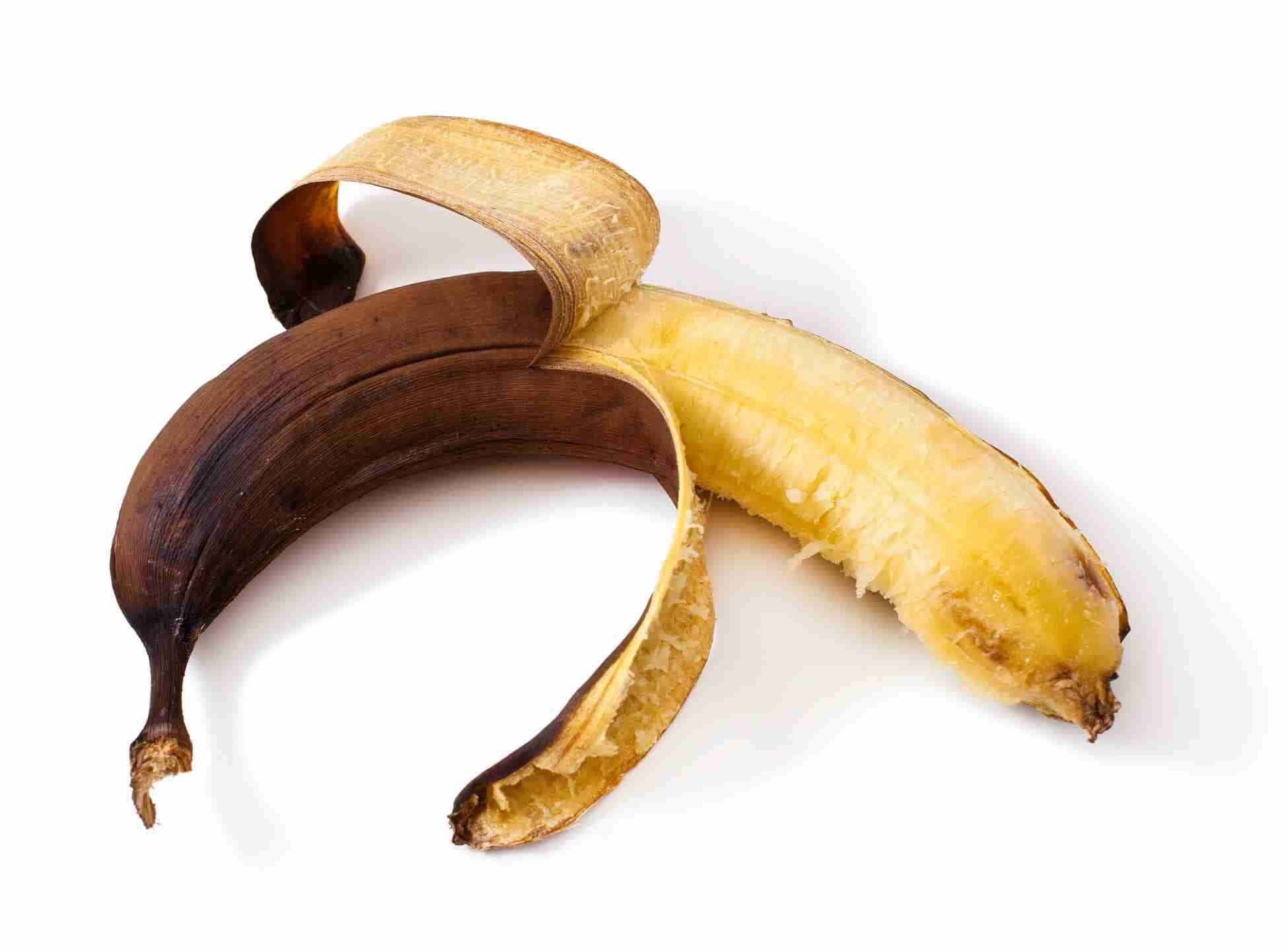
A couple of black spots are good for your peels, and subsequently the chicken. Moving past the speckled stage will up the sugar content and lower nutritional value drastically. While the main issue in bananas is the sugar content, the difference between normal and overripe bananas isn’t too dangerous and can be portion controlled for better management.
Bananas also have concerningly high sugar content, which can lead to sour crop mentioned above. Make sure to clean up any potential leftovers, as bananas attract a lot of animals. They also often end up coating your bird’s beak and feathers, as chickens aren’t the cleanest eaters.
As a tropical fruit – and a seasonal one at that – bananas can also get quite pricy. Fortunately, overripe bananas less ideal for human purchase can be bought for your flock, or even snagged for free! Just ask your nearby fruit vendor if they happen to have overripened bananas they can part with, and you might be able to get a great discount from it at the least.
Final Thoughts
Bananas make for amazing treats for chickens, and even the peels can be put to use rather than tossed like trash. Mind the sugar content and just how much of the treat you’re giving them, and everything should go just fine.

